A Comprehensive Guide for Indian Students Considering Studying Abroad
This guide demystifies the process of studying abroad for Indian students, from selecting universities to visa processes, and cultural adaptation to financial planning. It’s designed to equip students and parents with the insights needed to navigate the exciting transition to international education, transforming the dream into reality and preparing them for the academic journey ahead.
Join us as we delve into the essentials of pursuing an education beyond Indian shores, ensuring that you are well-prepared for the academic adventure that lies ahead. Take the next big step in your educational journey – connect with AdmitKard and let’s make your study abroad dreams a reality together!
Study In Australia
Studying in Australia offers a blend of world-class education and a laid-back lifestyle that can’t be found anywhere else. Known for its friendly locals, stunning landscapes, and a high standard of living, Australia has become a top destination for Indian students looking to broaden their horizons. The country’s educational institutions are renowned for their innovative teaching methods, research opportunities, and student support services.
If you’re dreaming of an education that combines academic excellence with adventure, look no further. Let’s embark on this journey to discover how studying in Australia can shape your future and lead to a fulfilling career path.
The top 5 universities to study in Australia are:
- Australian National University
- University of Sydney
- University of Melbourne
- University of New South Wales
- University of Queensland
Australian National University
{Global ranking 31, Australian rank 1}
Australian National University (ANU), standing proud with a global ranking of 31 and holding the premier position as Australia’s number one university, exemplifies academic excellence. It’s a beacon of higher education, attracting a community of driven and bright minds from across the globe. At ANU, you’ll find yourself in the heart of Canberra, a city that mirrors the university’s blend of innovation and culture.
University of Sydney
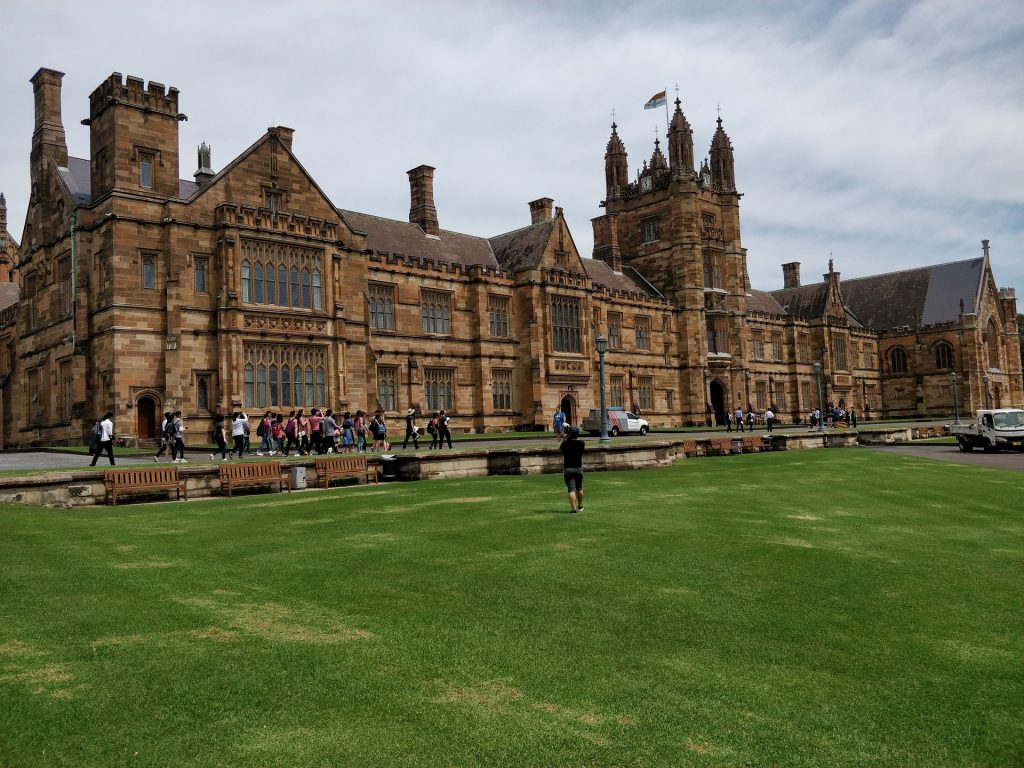
{Global ranking 40, Australian rank 2}
The University of Sydney, with its global ranking at 40 and being the second-ranked institution in Australia, stands as a paragon of higher education in the heart of one of the world’s most iconic cities. The university is not only recognized for its stately Gothic Revival architecture that graces the skyline but also for its rigorous academic programs and a vibrant, diverse student community.
University of Melbourne
{Global ranking 41, Australian rank 3}
The University of Melbourne, positioned at 41 on the global stage and third in Australia, is a cornerstone of intellectual and cultural diversity, offering a cosmopolitan academic experience in a city renowned for its arts, cafes, and vibrant street life. As Australia’s second oldest university, it is steeped in a tradition of innovation and excellence across all its disciplines.
University of New South Wales
{Global ranking 44, Australian rank 4}
The University of New South Wales (UNSW), with its impressive global ranking of 44 and positioned as the fourth-best university in Australia, is a powerhouse of innovation and academic prowess nestled in the bustling city of Sydney. UNSW is distinguished by its strong focus on scientific, technological, and professional disciplines, and is a hub for students who are keen to engage with cutting-edge research and industry-focused education.
The University of Queensland
{Global ranking 46, Australian rank 5}
The University of Queensland (UQ), claiming the 46th spot in global rankings and the fifth in Australia, stands out as an eminent institution that melds rigorous scholarship with a lively campus situated in Brisbane, a city celebrated for its subtropical climate and outdoor lifestyle. UQ is a leader in research and education, recognized for its substantial contributions to the sciences, medicine, and business innovation.
With robust industry links and a global network of alumni, UQ is an attractive choice for Indian students looking to make a mark in their field and beyond.
Australia university fees
| University | Undergraduate Program (AUD) | Postgraduate Program (AUD) | Doctorate (AUD) |
| Australian National University | 30,000-45,000 | 20,000-37,000 | 20,000-34,000 |
| University of Sydney | 35,000-50,000 | 22,000-40,000 | 24,000-39,000 |
| University of Melbourne | 33,000-48,000 | 21,000-38,000 | 22,000-36,000 |
| University of New South Wales | 32,000-47,000 | 25,000-41,000 | 26,000-43,000 |
| University of Queensland | 28,000-42,000 | 20,000-35,000 | 20,000-32,000 |
Permanent Residence(PR) In Australia
Australia’s allure for international students extends beyond academic prowess to its immigrant-friendly policies, offering a clear route to permanent residency (PR). Students often progress from a study visa to a post-study work visa, eventually seeking PR if they fulfill specific requirements. The country’s points-based system evaluates candidates on criteria like language skills and work experience, with Australian graduates receiving additional points. Key visa options include the Skilled Independent Visa and the Employer Nomination Scheme, with those in skill shortage areas having a better chance at PR, marrying educational goals with long-term career prospects in Australia.
Post-study Work Options In Australia
After completing their studies, international graduates in Australia can access various post-study work options, which can be a stepping stone to gaining valuable work experience and potentially pursuing permanent residency. The Temporary Graduate Visa (subclass 485) is particularly designed for international students who have recently graduated from an Australian institution. This visa has two streams:
1. Graduate Work Stream: For international students with qualifications and skills related to an occupation on the Skilled Occupation List. This visa is usually granted for 18 months.
2. Post-Study Work Stream: Available to students who have completed a higher education degree, regardless of their field of study. The duration of this visa can range from two to four years, depending on the level of study completed.
To be eligible, graduates must have completed a course or courses taking at least two academic years of study in Australia. The post-study work visa allows graduates to work in any job, for any employer, and to switch employers. It’s a flexible option that doesn’t require a sponsorship from an employer.
Why Study In Australia?
Studying in Australia combines top-tier education with an enriching cultural experience. Renowned for academic excellence, Australian degrees are globally recognized, providing a competitive edge. The practical, career-focused education system prepares students for global job markets. Australia’s multicultural society offers an inclusive environment for international students, while the cost of living and education balance affordability with high living standards. The natural beauty of Australia enhances the experience, allowing for adventurous extracurricular activities. Moreover, post-study work opportunities give graduates a chance to apply their skills within the country, making education here a pathway to comprehensive personal and professional growth.
Discover your ideal study destination and program with the AdmitKard’s Course Finder today!
Study In Canada
Canada, with its vast landscapes and multicultural cities, has emerged as a top destination for students from around the globe, including those from India. It’s celebrated not only for its academic excellence but also for its inclusive culture and high quality of life. Canadian universities are known for their research-oriented programs and are consistently ranked among the best in the world.
We’ll explore the esteemed institutions, diverse study programs, and the welcoming student communities that make Canada a beacon of higher learning. Additionally, we’ll discuss practical considerations such as visa processes, work-study opportunities, and the pathways to potentially making Canada your new home post-graduation.
The top 5 universities to study in Canada are:
- University of Toronto
- Mcgill University
- University of British Columbia
- University of Montreal
- University of Alberta

University of Toronto

{Global ranking 25, Canada rank 1}
The University of Toronto, sitting at a global ranking of 25 and proudly holding the title of the number one university in Canada, is an epitome of scholarly excellence and diversity. Its vibrant urban campus in the heart of Canada’s largest city is a powerhouse of innovation, research, and learning.
Mcgill University
{Global ranking 31, Canada rank 2}
McGill University, with a global ranking of 31 and as the second-ranked university in Canada, is synonymous with academic prestige and a rich legacy of research and innovation. Nestled in the culturally rich and bilingual city of Montreal, McGill offers a dynamic blend of North American and European charm, which complements its rigorous academic programs.
University of British Columbia
{Global ranking 45, Canada rank 3}
The University of British Columbia, positioned 45th globally and third in Canada, is a hub of global scholarship and sustainable innovation. Located between the mountains and the Pacific Ocean in Vancouver, UBC is recognized for its commitment to research, learning, and the exchange of ideas.
University of Montreal
{Global ranking 118, Canada rank 4}
The University of Montreal, with its global ranking at 118 and as the fourth-ranked institution in Canada, stands out for its vibrant culture and academic vitality in the francophone world. As the leading French-language university in North America, it offers a unique experience combining European flair with Canadian hospitality. The university is particularly recognized for its contributions to the fields of healthcare, artificial intelligence, and the arts.
University of Alberta
{Global ranking 119, Canada rank 5}
The University of Alberta, closely following with a global ranking of 119 and positioned as Canada’s fifth-best university, is a testament to excellence in education and research, particularly in areas such as energy, health sciences, and artificial intelligence. Situated in Edmonton, it provides a vibrant atmosphere that fosters both innovation and traditional scholarship.
Canada university fees
| University | Undergraduate Program (CAD) | Postgraduate Program (CAD) | Doctorate (CAD) |
| University of Toronto | 45,000 – 58,000 | 20,000 – 45,000 | 19,000 – 40,000 |
| McGill University | 42,000 – 55,000 | 18,000 – 40,000 | 16,000 – 35,000 |
| University of British Columbia | 39,000 – 52,000 | 16,000 – 38,000 | 15,000 – 34,000 |
| University of Montreal | 20,000 – 40,000 | 12,000 – 25,000 | 10,000 – 24,000 |
| University of Alberta | 30,000 – 45,000 | 18,000 – 30,000 | 17,000 – 32,000 |
Permanent Residence (PR) in Canada
In Canada, international students have various routes to permanent residency. The Express Entry system’s Canadian Experience Class (CEC) is optimal for those with local work experience. Provincial Nominee Programs (PNPs) cater to individuals with educational or work experience in particular provinces, while Quebec’s Experience Program (PEQ) is tailored for Quebec-educated students, emphasizing French proficiency.
The Post-Graduation Work Permit (PGWP) enables graduates to work and build experience for their residency application. Other initiatives, such as the Atlantic Immigration Pilot and the Rural and Northern Immigration Pilot, focus on those with job offers in specific regions. Entrepreneurs may explore the Start-up Visa Program. Navigating these options often requires guidance from immigration experts.
Post-study work options in Canada
Canada is recognized for its generous post-study work options, which allow international graduates to gain valuable work experience and contribute to the Canadian economy. The primary pathway for this is through the Post-Graduation Work Permit (PGWP) program, which permits students who have completed their program at an eligible Canadian post-secondary institution to stay and work in Canada.

Why study in Canada?
Canada distinguishes itself as an exceptional destination for international students through its globally recognized education system, renowned for rigorous academic standards and a wide array of program offerings. The educational experience is enriched by the country’s celebrated multicultural fabric, which provides a warm welcome to individuals from diverse backgrounds. In addition to academic pursuits, the Canadian lifestyle is a draw for many, offering a safe, clean, and friendly environment, consistently rated highly in terms of quality of life.
Uncover the course and country that align with your dreams through AdmitKard’s Course Finder!
Study In Germany
Germany stands as an academic stronghold in the heart of Europe, offering a robust educational experience that attracts students from every corner of the globe, including a growing number from India. Renowned for its tuition-free public universities, rigorous engineering and technical programs, and a rich cultural history, Germany provides a unique blend of high-quality education and affordability.

The top 5 universities to study in Germany are:

Technical University of Munich
{Global ranking 50, Germany rank 1}
The Technical University of Munich (TUM), holding the global ranking of 50 and the top position among German universities, is a powerhouse of innovation and scientific inquiry. Known for its strong emphasis on research and technology, TUM is located in the dynamic and progressive city of Munich, which is as rich in Bavarian tradition as it is in its modern, high-tech industry.
Ludwig Maximilian University of Munich
{Global ranking 63, Germany rank 2}
Ludwig Maximilian University of Munich, or LMU, with its global ranking at 63 and as the second-ranked university in Germany, is one of Europe’s oldest and most prestigious universities. Nestled in the heart of Munich, LMU is a hub for scholars passionate about a wide array of disciplines, from the humanities and social sciences to natural sciences and medicine.
Heidelberg University
{Global ranking 64, Germany rank 3}
Heidelberg University, also known as Ruprecht Karl University of Heidelberg, enjoys a global ranking of 64 and is the third-ranked university in Germany. As one of the world’s oldest surviving universities, it represents a blend of historic tradition with contemporary research and education. Situated in the picturesque city of Heidelberg, the university is steeped in the romanticism of its surrounding landscape and renowned for its commitment to the humanities, social sciences, and natural sciences.
Humboldt University of Berlin
{Global ranking 117, Germany rank 4}
Humboldt University of Berlin, with a global ranking of 117 and standing as the fourth-ranked institution in Germany, is celebrated for its rich academic heritage and its spirit of innovation. Located in the heart of Berlin, a city as renowned for its history as for its contemporary cultural vibrancy, Humboldt University is a place where tradition meets modernity.
The university has been a birthplace of modern thought, fostering an academic culture that encourages critical inquiry and intellectual freedom. With strong programs in the arts and humanities, social sciences, and natural sciences, Humboldt University continues to attract a diverse group of students, including those from India, who are looking for a rigorous education in a city that pulsates with artistic and political life.
Free University of Berlin
{Global ranking 130, Germany rank 5}
The Free University of Berlin, ranked 130th globally and the fifth in Germany, stands as a modern, forward-thinking institution in the vibrant metropolis of Berlin. Founded during the Cold War as a symbol of freedom in the Western part of the city, it has since developed into a leading research university, especially noted for its humanities, social sciences, natural sciences, and life sciences programs.
Germany university fees
| University | Undergraduate Program (EUR) | Postgraduate Program (EUR) | Doctorate (EUR) |
| Technical University of Munich | No tuition fees, only semester contribution of approx. 150 | No tuition fees, only semester contribution of approx. 150 | No tuition fees, only semester contribution of approx. 150 |
| Ludwig Maximilian University of Munich | No tuition fees, only semester contribution of approx. 150 | No tuition fees, only semester contribution of approx. 150 | No tuition fees, only semester contribution of approx. 150 |
| Heidelberg University | No tuition fees, only semester contribution of approx. 170 | No tuition fees, only semester contribution of approx. 170 | No tuition fees, only semester contribution of approx. 170 |
| Humboldt University of Berlin | No tuition fees, only semester contribution of approx. 300 | No tuition fees, only semester contribution of approx. 300 | No tuition fees, only semester contribution of approx. 300 |
| Free University of Berlin | No tuition fees, only semester contribution of approx. 300 | No tuition fees, only semester contribution of approx. 300 | No tuition fees, only semester contribution of approx. 300 |
Here’s a table summarizing the estimated monthly living expenses for students in Germany:
| Expense Category | Cost Range (EUR/month) |
| Rent (shared flat or student dorm) | 250 – 400 |
| Food | 150 – 250 |
| Health Insurance | 80 – 100 |
| Public Transportation | 30 – 60 |
| Study Materials | 20 – 50 |
| Leisure Activities | 30 – 60 |
Permanent Residence in Germany
International students in Germany can access multiple PR routes after graduation, reflecting the country’s appreciation for skilled professionals. The “Niederlassungserlaubnis,” or settlement permit, is available to non-EU graduates who can support themselves financially, have lived in Germany on a residence permit for typically two years, and are employed at a level matching their qualifications. Proficiency in the German language and societal norms, along with health insurance and contributions to the pension scheme for at least 24 months, are crucial. European Blue Card holders may be eligible for PR sooner, with reduced language requirements if they have been employed for 21 months.
Post-study work options in Germany
Germany offers attractive post-study work options for international students, allowing them to remain in the country after completing their studies to seek employment. Recognizing the contribution of skilled graduates to its economy, Germany provides a practical and encouraging environment for students to transition into the workforce.
Upon graduation, international students can extend their residence permit for up to 18 months to look for a job that corresponds to their qualifications. During this job-seeking period, graduates are allowed to work in any capacity to support themselves, without restriction on the number of working hours.
Once they secure a job relevant to their studies, students can then convert their residence permit into an EU Blue Card or a German residence permit for employment. The EU Blue Card is particularly beneficial for those with a recognized university degree and a job with a minimum salary threshold, as it can lead to permanent residency faster than other permits.
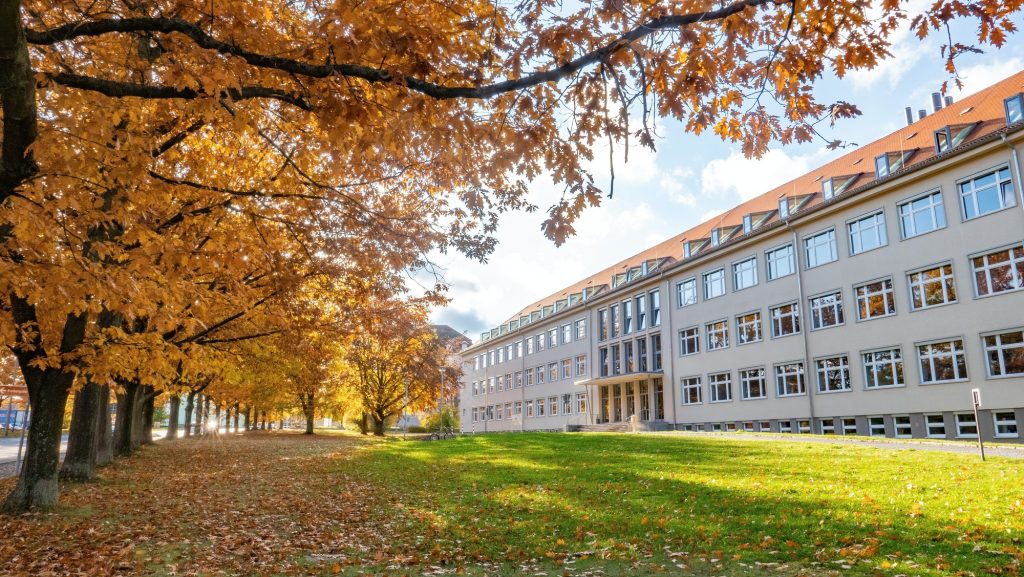
Why study in Germany?
Germany is increasingly popular among international students, and for good reason. It offers a rare combination of high-quality education, a wide range of study options, and substantial cost savings. German universities are renowned for their academic rigor, state-of-the-art facilities, and leading-edge research. Students have the opportunity to learn from some of the leading minds in their fields and gain hands-on experience through research, internships, and partnerships with leading companies.
Moreover, Germany is one of the few countries that offer free tuition or very low-cost higher education to international students at public universities. This makes it an economically attractive option, especially for students from India who are looking to minimize educational expenses.
Let AdmitKard’s Course Finder help you pinpoint your perfect academic path and destination now!
Study In Singapore
Singapore, often hailed as the crossroads of the East and West, offers a dynamic and competitive education environment for international students. With its strategic position in Asia, world-class universities, and reputation as a global business hub, Singapore presents an ideal blend of educational excellence and professional opportunities.

The top universities to study in Singapore are:
- National University of Singapore (NUS)
- Nanyang Technological University (NTU)
- Singapore Management University (SMU)

National University of Singapore (NUS)
It is the country’s flagship university, consistently ranked as one of the top universities in Asia and the world. Known for its comprehensive curriculum and innovative research, NUS offers a wide array of undergraduate and postgraduate programs.
Nanyang Technological University (NTU)
It is another world-renowned institution, distinguished for its engineering and technology programs, as well as business and the arts. With a sprawling eco-friendly campus and a strong emphasis on collaborative and interdisciplinary education, NTU is at the forefront of nurturing leaders and innovators.
Singapore Management University (SMU)
With its urban campus in the heart of the city, it is a leader in business, management, and law education. SMU is characterized by its interactive pedagogy, strong links to the business community, and an emphasis on grooming entrepreneurial talents.
University Fees In Singapore
| University | Undergraduate Program (SGD) | Postgraduate Program (SGD) |
| National University of Singapore (NUS) | 17,550 – 61,650 | 20,000 – 50,000 |
| Nanyang Technological University (NTU) | 17,100 – 54,000 | 21,000 – 52,000 |
| Singapore Management University (SMU) | 24,500 – 29,000 | 45,000 upwards |
Permanent Residence In Singapore
Gaining permanent residency (PR) in Singapore is an aspiration for many international students after their academic endeavors. The process, while rigorous, starts with securing employment in Singapore and transitioning from a student visa to a work pass. The government evaluates PR applications based on economic contributions, professional standing, duration of residence, and assimilation into the community.
While there isn’t a stipulated minimum period of residence to be eligible for PR, a stable employment history in Singapore can enhance one’s application. The economic impact of the applicant, including job role, salary, and taxes paid, alongside societal integration, are critical factors considered during the PR application process, which is overseen by the Immigration & Checkpoints Authority (ICA).
Post-study Work Options In Singapore
Singapore offers a conducive environment for international students to transition from study to employment. Upon completion of their studies, students can apply for a work pass, which allows them to remain in the country and seek employment. The most common route is the Employment Pass for those with job offers that meet a minimum salary threshold, which is reflective of the applicant’s qualifications and experience.
Alternatively, the S Pass is available for mid-skilled technical staff, though it comes with its own set of criteria and salary requirements. For recent graduates, especially those from reputable institutions, the opportunities for securing such passes are generally favorable, thanks to Singapore’s thriving economy and demand for skilled labor.
Students also have the option to apply for a Long-Term Visit Pass, which allows them to stay in Singapore for a year to search for a job. It’s important for graduates to be aware of the stringent criteria for work passes and to plan their job search accordingly, often with the help of their university’s career services. The strategic approach to finding employment in Singapore’s competitive job market is crucial for securing the right to work and reside in the country post-graduation.
Why study in Singapore?
Studying in Singapore is an attractive option for international students due to its reputation as a global business hub with a strategic location in Asia, offering access to myriad professional opportunities. The country’s educational institutions are lauded for their high standards, with several universities ranking prominently on global charts, ensuring that students receive a world-class education.
The nation’s commitment to innovation and research provides students with the chance to engage in cutting-edge work, particularly in sectors like finance, technology, and life sciences. Singapore’s education system is also uniquely positioned to offer a blend of Eastern and Western perspectives, allowing for a comprehensive global outlook.
Kickstart your global education journey – choose your course with AdmitKard’s Course Finder!
Study In France
France, with its romantic cities, rich history, and revered academic tradition, presents an alluring destination for students around the world looking to study abroad. It is a country that prides itself on its esteemed educational institutions, ranging from grande’s écoles to comprehensive universities, many of which are frequently found at the top of international rankings.
In this guide, we will explore what makes France a standout choice for international students, particularly those from India. We’ll delve into the variety of programs available, many of which offer courses in English to cater to the global student body, while also providing opportunities to master the French language.
The top 5 universities to study in France are:
- PSL Research University
- École Polytechnique
- Sorbonne University
- CentraleSupélec
- Ecole Normale Supérieure de Lyon


PSL Research University
{Global ranking 52, France rank 1}
PSL Research University Paris, holding the prestigious global ranking of 52 and sitting at the pinnacle of France’s academic institutions, is a collegiate university that brings together a constellation of renowned educational and research establishments. Known for its intensive research programs and a multidisciplinary approach, PSL offers a spectrum of subjects, fostering an environment where innovation and tradition intersect, creating an academic experience that is both deeply rooted in history and aggressively forward-facing.
École Polytechnique
{Global ranking 68, France rank 2}
École Polytechnique, also known as l’X, is globally recognized, ranking 68th worldwide and second in France. It’s an institution synonymous with excellence in science and engineering. Known for its selective programs and distinguished alumni, including Nobel laureates and industry leaders, École Polytechnique combines a rigorous scientific curriculum with training in humanities and social sciences, ensuring graduates are well-rounded leaders prepared to tackle global challenges.
Sorbonne University
{Global ranking 83, France rank 3}
Sorbonne University, carrying the legacy of the historic University of Paris, stands globally at rank 83 and is the third-ranked institution in France. It is a beacon of arts, humanities, and sciences, offering a diverse and robust academic environment. The university is revered for its rich intellectual tradition, comprehensive research opportunities, and a commitment to academic freedom, attracting students who seek a holistic education in the heart of one of the world’s most culturally significant cities.
CentraleSupélec
{Global ranking 138, France rank 4}
CentraleSupélec, which has achieved a global ranking of 138 and is recognized as the fourth-ranked institution in France, is a premier institution that specializes in engineering and systems sciences. Emerging from a merger of two of the most prestigious grandes écoles in France, Centrale Paris and Supélec, the school has a strong focus on producing innovators and industry leaders who are adept in tackling complex technological and engineering challenges.
Ecole Normale Supérieure de Lyon
{Global ranking 161, France rank 5}
Ecole Normale Supérieure de Lyon, with a global ranking of 161, stands as the fifth-ranked academic institution in France. This prestigious school is renowned for its intensive research and teaching in the sciences and humanities. It’s part of the grand tradition of French “écoles normales supérieures” dedicated to cultivating academic excellence and intellectual leaders across various disciplines.
France university fees
| University | Undergraduate Program (EUR) | Postgraduate Program (EUR) | Doctorate (EUR) |
| PSL Research University | 170 – 601 | 243 – 601 | 380 – 601 |
| École Polytechnique | 0 – 15,000 | 0 – 15,000 | 0 – 15,000 |
| Sorbonne University | 170 – 601 | 243 – 601 | 380 – 601 |
| CentraleSupélec | 2,500 – 10,000 | 2,500 – 10,000 | 2,500 – 10,000 |
| Ecole Normale Supérieure de Lyon | 170 – 601 | 243 – 601 | 380 – 601 |
Tailor your study abroad experience with the precise course and country via AdmitKard’s Course Finder!
Permanent Residence In France
Achieving permanent residence (PR) in France is an option for international students who wish to stay in the country after completing their studies. After living continuously for five years in France on a legal residence permit, students may apply for a “Carte de résident,” which is a ten-year renewable permit.
During the five years, students must demonstrate integration into French society, which includes proficiency in the French language and an understanding of French civic life. Employment is another crucial factor, and having a stable job related to one’s field of study can contribute positively to the application.
It is worth noting that certain categories of long-term visas, such as the “Talent Passport” for highly skilled graduates, can lead to PR in a shorter time frame. The process for obtaining PR can be complex, and it’s recommended that applicants seek advice from legal professionals or the local “Préfecture” to ensure they meet all the necessary requirements and to guide them through the application process.
Post-study work options In France
In France, international students have the opportunity to extend their stay after graduation to seek employment or set up a business. Upon completing their higher education, non-EU students can apply for a temporary residence authorization known as the “Autorisation Provisoire de Séjour” (APS), which allows them to stay in France for up to one year to look for work related to their field of studies. If they secure a job with a salary at least 1.5 times the minimum wage, they can then apply for a change of status to a work permit.
For graduates from a selection of top institutions, the period of the APS can be extended up to two years. France also offers the “Talent Passport,” a multi-year residence permit for skilled graduates, which facilitates the stay of those planning to engage in highly skilled work.
Why study in France?
Studying in France offers a blend of academic prestige, cultural depth, and innovation. French universities, renowned for their rigorous intellectual tradition, provide a wide range of programs with strong research and industry linkages, particularly in fields such as fashion, gastronomy, engineering, and the arts.
The French education system is characterized by its balance of theoretical knowledge and practical application, with many programs offering internships with leading companies. Additionally, France is a leader in language and cultural studies, and it encourages students to immerse themselves in the French language and culture.
Seek out the best study program for you in your dream country with AdmitKard’s Course Finder now!
Study In USA
Embarking on a study adventure in the United States is akin to stepping into a world where education molds the forefront of innovation and ambition. U.S. universities are not just educational institutions; they are incubators for the world’s future leaders, thinkers, and pioneers.
The American educational odyssey promises a fusion of rigorous scholarship and life-shaping experiences, set against a backdrop of campus traditions and the pursuit of the American dream. It’s an academic chapter that goes beyond books, where learning intertwines with personal growth and discovery.
The top 5 universities to study in France are:
- Harvard University
- Stanford University
- Massachusetts Institute of Technology (MIT)
- University of California, Berkeley (UCB)
- University of California, Los Angeles (UCLA)

Harvard University
{Ranking 1}
Harvard University, a name that resonates with academic excellence and storied tradition, stands at the pinnacle of higher education with a global ranking of 1. Nestled in Cambridge, Massachusetts, Harvard is the oldest institution of higher learning in the United States and is renowned for its rigorous curriculum, groundbreaking research, and a legacy of producing leaders who shape the world across various fields.
Stanford University
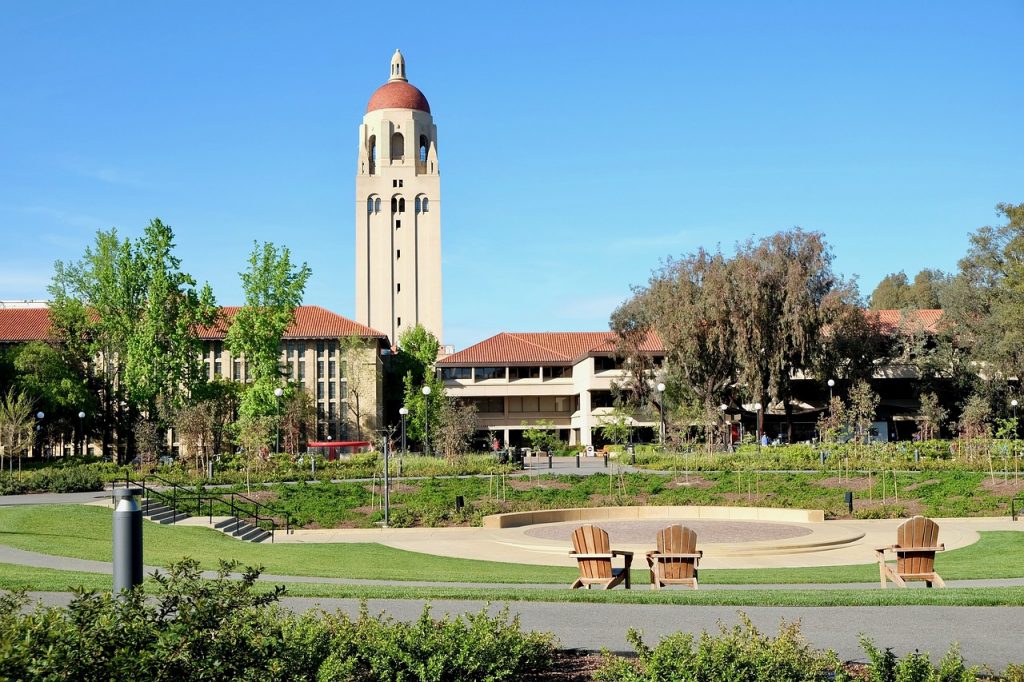
{Ranking 2}
Stanford University, occupying the second spot in global rankings, is synonymous with innovation and entrepreneurship. Located in the heart of California’s Silicon Valley, Stanford has been the cradle for some of the world’s most influential tech giants and startups. It’s a place where cutting-edge research and intellectual exploration are the norms, fostering an environment that challenges and empowers students to push the frontiers of knowledge.
Massachusetts Institute of Technology (MIT)
{Ranking 3}
The Massachusetts Institute of Technology (MIT), renowned globally and ranked third, stands as a bastion of science, engineering, and technology. Situated in Cambridge, Massachusetts, MIT is celebrated for its culture of practical problem-solving and its contributions to modern science. It’s an institution where the boundaries of innovation are continually expanded, and students are encouraged to apply their knowledge to address complex global challenges.
University of California, Berkeley (UCB)
{Ranking 4}
The University of California, Berkeley, commonly referred to as UC Berkeley or UCB, holds the fourth rank globally, asserting its reputation as a powerhouse of academic vigor and social activism. Perched by the San Francisco Bay, UC Berkeley is recognized for its distinguished faculty, robust research initiatives, and a history of public service. It’s a campus alive with a spirit of inquiry and debate, pushing students to engage deeply with the world around them.
University of California, Los Angeles (UCLA)
{Ranking 5}
The University of California, Los Angeles (UCLA), with its global rank of 5, is an emblem of academic diversity and excellence in the vibrant city of Los Angeles. Known for its competitive admission standards, extensive research facilities, and a rich tapestry of cultural and extracurricular activities, UCLA offers a dynamic and inclusive environment for learning and growth. It’s an institution where students from all walks of life come together to innovate, explore, and shape the future.
USA university fees
| University | Undergraduate Program (USD) | Postgraduate Program (USD) | Doctorate (USD) |
| Harvard University | 50,000 – 55,000 | 50,000 – 55,000 | 50,000 – 55,000 |
| Stanford University | 55,000 – 60,000 | 55,000 – 60,000 | 55,000 – 60,000 |
| Massachusetts Institute of Technology (MIT) | 53,000 – 57,000 | 53,000 – 57,000 | 53,000 – 57,000 |
| University of California, Berkeley (UCB) | 14,000 – 44,000 | 14,000 – 44,000 | 14,000 – 44,000 |
| University of California, Los Angeles (UCLA) | 3,000 – 43,000 | 3,000 – 43,000 | 3,000 – 43,000 |
Permanent Residence In USA
Achieving permanent residence (PR) in the USA, commonly known as getting a Green Card, is a goal for many international students who wish to remain in the country after their studies. The route to permanent residency can be complex and is often achieved through employment, family sponsorship, or other special categories.
For students, the most common path to PR is through employment-based sponsorship. After graduation, students typically begin on an F-1 visa and may take advantage of Optional Practical Training (OPT) to work in their field of study for up to 12 months, which can be extended for another 24 months for STEM graduates.
If an employer is willing to sponsor an international student for a Green Card, they must usually go through a process called labor certification, proving that there are no qualified U.S. workers available for the position. The student can then apply for an employment-based visa category, such as EB-2 or EB-3.
Another potential pathway is the Diversity Immigrant Visa Program, also known as the Green Card Lottery, which makes up to 50,000 immigrant visas available annually, drawn from random selection among all entries to individuals who are from countries with low rates of immigration to the United States.
Post-study work options In USA
In the USA, international students have the opportunity to remain and work after their studies through programs like Optional Practical Training (OPT) and the H-1B visa. OPT allows students on F-1 visas to work for up to 12 months in their field of study, with STEM graduates eligible for a 24-month extension.
For longer-term employment, graduates often seek sponsorship for an H-1B visa, a category for specialized workers. The H-1B visa has an annual cap and is granted through a lottery system, but it can lead to sponsorship for a Green Card.
These options offer valuable work experience and the opportunity to transition to permanent employment in the USA, though they require careful planning and adherence to visa regulations.
Why study in the USA?
The USA is an academic powerhouse known for its innovative approach to higher education, offering a diverse array of programs across various disciplines. American universities are recognized for their research opportunities, quality of education, and academic flexibility, which allows students to customize their learning experiences.
Furthermore, the USA is home to some of the world’s leading companies and industries, providing students with unparalleled internship and employment opportunities. With a degree from a U.S. institution, graduates are well-positioned to compete in the global job market.
AdmitKard’s Course Finder is your tool to unlock the right program in the USA for your study abroad!
Study In UK
The United Kingdom, with its illustrious history of academic excellence, stands as one of the most sought-after destinations for higher education. British universities are steeped in a legacy that combines age-old traditions with modern research and innovation. From the hallowed halls of Oxford and Cambridge to the contemporary campuses sprinkled across England, Scotland, Wales, and Northern Ireland, the UK is a tapestry of educational diversity.
The top 5 universities to study in UK are:
- University of Oxford
- University of Cambridge
- Imperial College London
- UCL (University College London)
- University of Edinburgh

University of Oxford
{Global ranking 5, UK rank 1}
The University of Oxford, holding a revered global ranking of 5 and the top spot within the UK, is synonymous with academic heritage and excellence. As the oldest university in the English-speaking world, Oxford is a constellation of historic colleges and modern research facilities, offering a unique educational experience steeped in tradition yet driven by innovation.
University of Cambridge
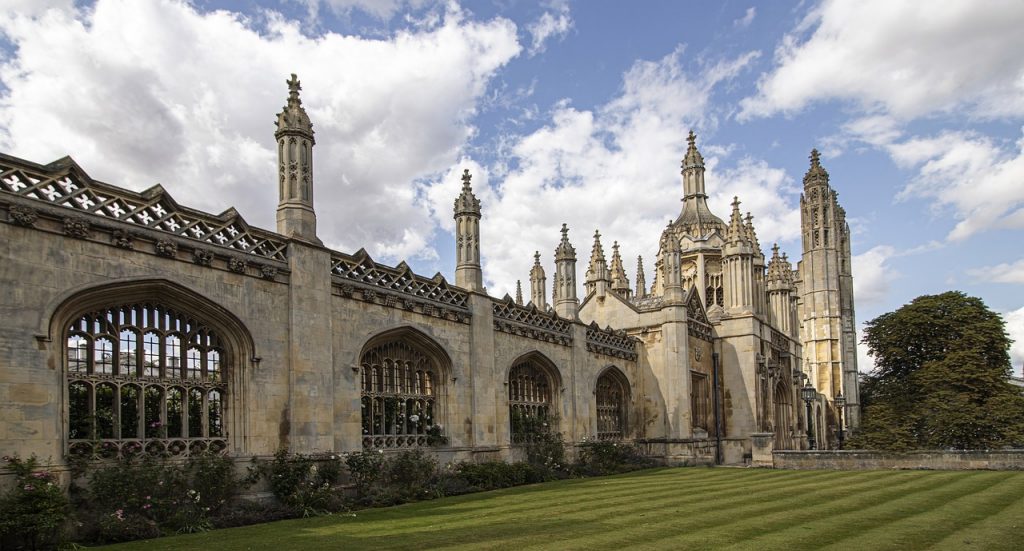
{Global ranking 7, UK rank 2}
The University of Cambridge, with its esteemed global ranking of 7 and positioned as the second premier institution in the UK, is an emblem of academic prestige and groundbreaking research. This storied university boasts a history of shaping some of the finest minds and is known for an education system centered around tutorial-based learning that fosters deep intellectual engagement.
Imperial College London
{Global ranking 8, UK rank 3}
Imperial College London, ranked 8th globally and third in the UK, stands out as a leader in science, engineering, medicine, and business. This institution is revered for its research-intensive environment and its commitment to applying science to real-world problems. With a central London location, it offers students a vibrant urban experience alongside a rigorous academic life.
UCL (University College London)
{Global ranking 10, UK rank 4}
UCL (University College London), with a global ranking of 10 and holding the fourth position in the UK, is renowned for its progressive ethos and research excellence. Located in the heart of London, UCL is a multidisciplinary institution that encourages a collaborative approach to learning and discovery, attracting students and academics committed to making a tangible impact on society.
University of Edinburgh
{Global ranking 20, UK rank 5}
The University of Edinburgh, ranked 20th globally and fifth in the UK, is celebrated for its rich academic heritage and vibrant research culture. Nestled amongst the historic streets and the dramatic landscape of Scotland’s capital, the university is a fusion of ancient architecture and cutting-edge facilities, offering a world-class education and a picturesque setting for students to learn and grow.
UK university fees
| University | Undergraduate Program (GBP) | Postgraduate Program (GBP) | Doctorate (GBP) |
| University of Oxford | 24,000 – 38,000 | 24,000 – 40,000 | 24,000 – 40,000 |
| University of Cambridge | 22,000 – 37,000 | 26,000 – 42,000 | 26,000 – 42,000 |
| Imperial College London | 30,000 – 35,000 | 32,000 – 37,000 | 32,000 – 37,000 |
| UCL (University College London) | 21,000 – 29,000 | 22,000 – 30,000 | 22,000 – 30,000 |
| University of Edinburgh | 20,000 – 28,000 | 21,000 – 29,000 | 21,000 – 29,000 |
Embark on a prestigious academic journey – find the UK course tailored for you with AdmitKard’s Course Finder!
Permanent Residence In UK
Obtaining permanent residence in the UK, known as Indefinite Leave to Remain (ILR), is an option for international students who have legally lived in the UK for a certain period, typically five years. To qualify, students must meet specific criteria, including demonstrating knowledge of the English language and passing the “Life in the UK” test.
Students generally transition from a student visa to a work visa, such as the Tier 2 (General) visa, after their studies. Holding this work visa for five years can lead to eligibility for ILR. Additionally, the UK has introduced the Graduate Immigration Route for international students who have completed a degree, allowing them to stay for two years (three years for Ph.D. graduates) to work or look for work.
After obtaining ILR, individuals may eventually apply for British citizenship. The rules and policies for obtaining ILR can be complex and subject to change, so it’s advisable for students to consult with an immigration lawyer or advisor to understand the current requirements and procedures.
Post-study work options In UK
Post-study work opportunities in the UK have been revitalized with the introduction of the Graduate Immigration Route. This post-study work visa allows international students who have completed an eligible UK degree to stay in the country for two years (three years for Ph.D. graduates) to work or look for work at any skill level. After this period, graduates can switch to a different visa category, such as a skilled work visa, if they find a job that meets the specific requirements, including a minimum salary threshold.
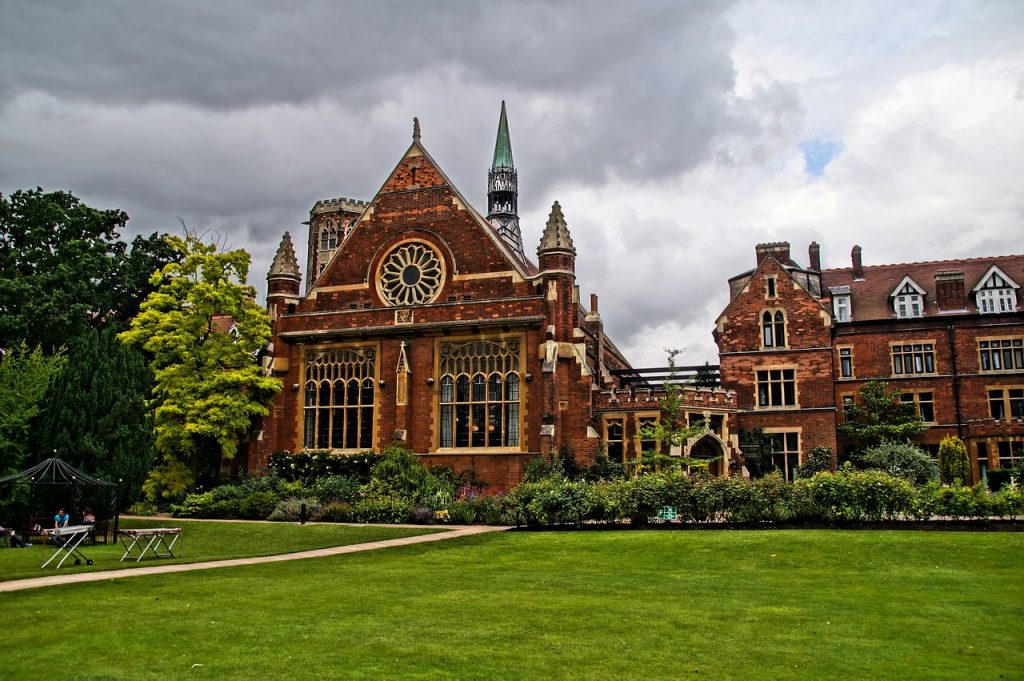
Why study in the UK?
The UK is revered for its distinguished academic legacy, offering a wide spectrum of courses and a quality of education that’s respected worldwide. British universities foster a blend of traditional teaching methods and innovative approaches, empowering students with critical thinking and research skills.
The UK’s education system is known for its rigorous standards and the depth of its specialization. Students can benefit from the extensive networks and industry links that many UK universities maintain, providing a gateway to career opportunities both in the UK and internationally.
Explore your dream universities with AdmitKard – Start your journey now!
Study In New Zealand
New Zealand, known for its breathtaking landscapes and vibrant culture, is also carving out a reputation as a premier destination for international education. With an emphasis on hands-on learning and critical thinking, New Zealand’s educational system is innovative and research-driven, offering a wide array of programs that cater to a diverse set of academic interests.
We’ll explore the unique advantages of studying in New Zealand, such as the country’s welcoming approach to international students and a balance between rigorous academics and a laid-back lifestyle. We’ll also provide insights into the practical aspects of life as a student in New Zealand, from navigating visa applications to embracing the Maori concept of ‘Manaakitanga’, which embodies the warm and hospitable nature of the local people.
The top 4 universities to study in New Zealand are:
- University of Otago
- University of Auckland
- University of Canterbury
- University of Waikato

University of Otago
The University of Otago, positioned in the scenic city of Dunedin, holds the distinction of being New Zealand’s oldest university. Renowned for its academic excellence, Otago offers a diverse range of programs with particular strengths in the health sciences, including a well-regarded medical school.
University of Auckland
The University of Auckland, located in the heart of New Zealand’s largest and most diverse city, is the country’s premier institution known for its comprehensive range of study options and research excellence. As a leading center of higher education, it offers students state-of-the-art facilities and a dynamic urban experience.
University of Canterbury
The University of Canterbury, set in the picturesque city of Christchurch, is a prestigious institution that blends a robust academic tradition with innovative research. With a strong engineering faculty, it also offers a broad spectrum of programs across arts, sciences, and commerce.
University of Waikato
The University of Waikato, located in the city of Hamilton, is recognized for its forward-thinking education system and strong emphasis on student experience. It offers a wide range of programs with notable strengths in law, management, and Māori indigenous studies.
Set the course for success! Discover your study destination with AdmitKard’s Course Finder today!
New Zealand university fees
| University | Undergraduate Program (NZD) | Postgraduate Program (NZD) | Doctorate (NZD) |
| University of Otago | 29,000 – 36,000 | 30,000 – 40,000 | 7,000 – 10,000 |
| University of Auckland | 33,000 – 42,000 | 33,000 – 50,000 | 7,000 – 10,000 |
| University of Canterbury | 28,000 – 35,000 | 29,000 – 37,000 | 6,500 – 9,500 |
| University of Waikato | 25,000 – 32,000 | 26,000 – 35,000 | 6,000 – 9,000 |
Permanent Residence In New Zealand
Permanent Residence (PR) in New Zealand is attainable for international students after they complete their studies and choose to remain in the country. The pathway to PR typically involves transitioning from a student visa to a post-study work visa, which allows graduates to work for any employer and in almost any job. This work experience can then potentially lead to a residence visa under the Skilled Migrant Category, where points are awarded for factors such as skilled employment, work experience, and qualifications.
To apply for PR, individuals must demonstrate good character, health, and proficiency in English. They must also meet the criteria of the points-based system, which assesses their ability to contribute to New Zealand’s economy and society.
Post-study work options In New Zealand
New Zealand provides post-study work options that allow international students to extend their stay after graduation. Through the Post-Study Work Visa, graduates can work for any employer and in almost any job for up to three years, which gives them valuable work experience and the opportunity to contribute to the New Zealand economy.
This visa acts as a bridge to long-term employment and potential residence in the country, especially for those who gain skilled employment. The duration of the Post-Study Work Visa depends on the level of qualification and where the student studied. By obtaining this work experience, graduates can increase their chances of successfully applying for a resident visa under the Skilled Migrant Category.

Why study in New Zealand?
New Zealand’s appeal for international students lies in its combination of high-quality education, stunning natural beauty, and a reputation for being safe and welcoming. The country’s universities are known for their research and academic excellence, and they offer a wide range of programs that often include hands-on experience and real-world problem-solving.
Education in New Zealand emphasizes critical thinking and innovation, equipping students with skills that are highly valued globally. Furthermore, the country’s unique approach to learning incorporates its indigenous Māori culture, providing students with a rich cultural perspective.
Study In Ireland
Ireland, affectionately known as the Emerald Isle, offers a vibrant hub for education with its blend of rich cultural heritage and a commitment to academic excellence. Irish universities are recognized for their innovative research, quality teaching, and strong links to industry, particularly in technology and pharmaceuticals, due to the country’s position as a European headquarters for several multinational corporations.
The top 5 universities to study in Ireland are:
- Trinity College Dublin (TCD)
- University College Dublin (UCD)
- National University of Ireland, Galway (NUIG)
- University College Cork (UCC)
- Dublin City University (DCU)

Trinity College Dublin (TCD)
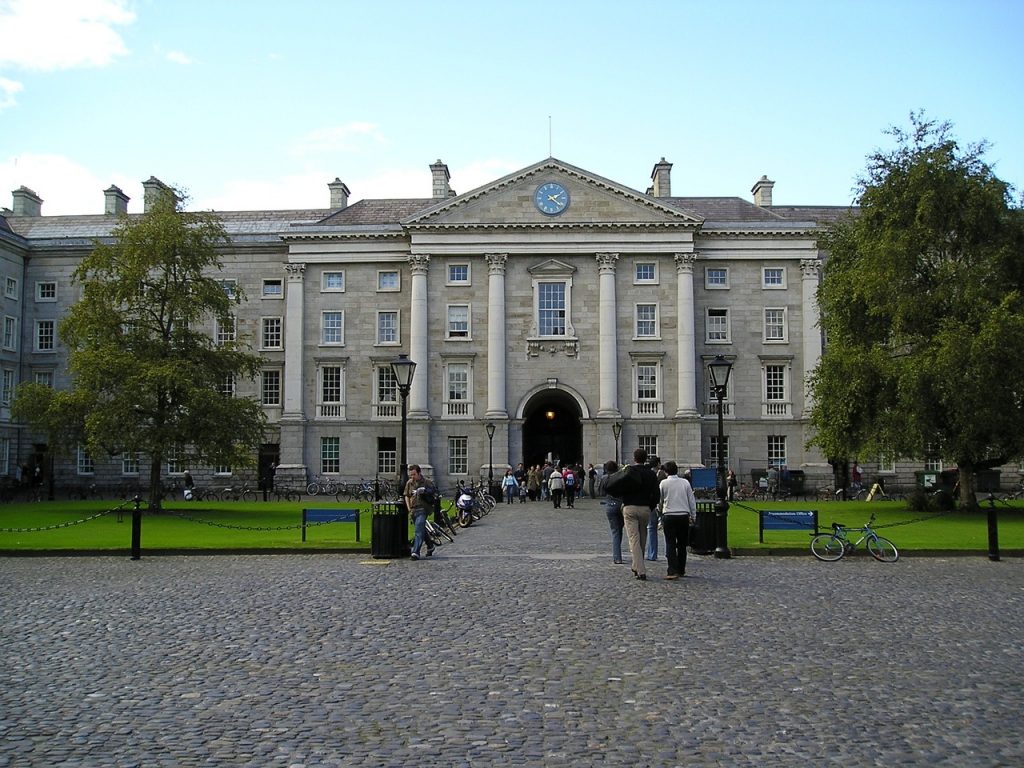
{Global ranking 101, Ireland rank 1}
Trinity College Dublin (TCD), with a global ranking of 101, is Ireland’s highest-ranked university and one of the most prestigious educational institutions in the world. Established in 1592, it is steeped in history yet remains at the forefront of innovation and research. TCD offers a vibrant campus life in the heart of Dublin, providing students with a rich blend of cultural experiences and a rigorous academic environment.
University College Dublin (UCD)
{Global ranking 177, Ireland rank 2}
University College Dublin (UCD), standing as the second-ranked institution in Ireland with a global ranking of 177, is celebrated for its comprehensive range of disciplines and research-intensive programs. Located just outside Dublin’s city center, UCD boasts a modern campus with state-of-the-art facilities, fostering a dynamic and inclusive learning environment where students from all over the world can thrive.
National University of Ireland, Galway (NUIG)
{Global ranking 238, Ireland rank 3}
The National University of Ireland, Galway (NUIG), ranked 238th globally and third in Ireland, is acclaimed for its dedication to excellence in teaching and research. Nestled in the vibrant city of Galway, known for its artistic flair and historical significance, NUIG offers a community-oriented campus experience and a strong tradition in the humanities, alongside growing expertise in areas such as biomedical science and engineering.
University College Cork (UCC)
{Global ranking 286, Ireland rank 4}
University College Cork (UCC), with a global ranking of 286, holds its position as the fourth-ranked institution in Ireland. Recognized for its research in fields such as food science, environmental sustainability, and health, UCC combines a historic campus with a progressive outlook on education. Situated in the bustling city of Cork, it offers a warm student community set amidst a culture-rich region.
Dublin City University (DCU)
{Global ranking 439, Ireland rank 5}
Dublin City University (DCU), positioned at 439 in the global rankings and fifth in Ireland, is a young, innovative institution known for its enterprise-focused approach to education. With a strong emphasis on integrating academic theory with practical experience, DCU offers a dynamic learning environment. It’s particularly noted for its contributions to the fields of science and technology, business, and communications, all within the vibrant capital city of Dublin.
Ireland university fees
| University | Undergraduate Program (EUR) | Postgraduate Program (EUR) | Doctorate (EUR) |
| Trinity College Dublin (TCD) | 18,000 – 24,000 | 18,000 – 35,000 | 13,000 – 18,000 |
| University College Dublin (UCD) | 19,000 – 24,000 | 19,500 – 24,500 | 13,500 – 18,500 |
| National University of Ireland, Galway (NUIG) | 15,000 – 20,000 | 15,500 – 21,000 | 14,000 – 19,000 |
| University College Cork (UCC) | 16,000 – 22,000 | 16,000 – 22,000 | 14,000 – 20,000 |
| Dublin City University (DCU) | 15,000 – 20,000 | 15,000 – 20,000 | 14,000 – 19,000 |
Chart your path to success; utilize AdmitKard’s Course Finder to select your dream course in Ireland!
Permanent Residence In Ireland
In Ireland, international students can take a route towards permanent residency after completing their studies. This journey begins with a permission under the Third Level Graduate Scheme, which allows non-EU/EEA students who have graduated from Irish higher education institutions to remain in Ireland for 24 months to seek employment or apply for a work permit or green card.
If they secure employment, they can then apply for a General Employment Permit or a Critical Skills Employment Permit. Holders of the latter can apply for permanent residency after just two years, while other employment permit holders may apply after five years of legally working and living in Ireland.
The process to secure permanent residency is stringent, with requirements including stable employment, good character, and financial independence. Due to the complexity of immigration laws, many applicants seek professional advice to navigate the process. It’s important to stay updated on current regulations, as immigration policies can change.
Post-study work options In Ireland
Ireland offers post-study work options for international graduates through the Third Level Graduate Programme, which allows non-EU/EEA students who have completed their studies to remain in Ireland for 24 months to seek employment. Once they find a job, they can then obtain a work permit to continue their stay.
The Irish government also provides the Critical Skills Employment Permit for individuals in designated professions, which facilitates easier access to permanent residency. This openness to international students reflects Ireland’s commitment to attracting and retaining skilled talent.

Why study in Ireland?
Ireland is a compelling choice for international students due to its high standard of education and a welcoming atmosphere. The country’s universities are well-integrated into the global academic community, offering a wide range of programs that are both innovative and responsive to industry trends, particularly in the technology sector where Ireland is a European hub.
The Irish education system emphasizes independent thinking and application-based learning, providing students with a strong foundation for their future careers. Additionally, Ireland’s rich cultural heritage and stunning landscapes offer a backdrop for a fulfilling university experience.
For students looking to remain after their studies, Ireland’s post-study work opportunities and the potential pathway to permanent residency add to the country’s appeal. With English as the spoken language and a reputation for friendliness, Ireland serves as an accessible and nurturing environment for international students.
Schedule a call today with AdmitKard for all your study abroad queries!
Embarking on an educational adventure abroad is a monumental step, and you deserve the best guidance to ensure your journey is successful. That’s where AdmitKard steps in. Our vision is to equip you with comprehensive knowledge and personalized support, transforming your dream of studying abroad into a reality. Our mission is not just about getting you admitted to your desired institution; it’s about molding you into a global citizen equipped for future success.
With AdmitKard, you gain access to expert advice tailored to your aspirations, driven by state-of-the-art technology and data. Whether it’s course selection, application processes, or visa assistance, we’re here to guide you every step of the way.
Schedule a call with AdmitKard today, and let us help you navigate the exciting world of international education with confidence and clarity. Your academic and career ambitions deserve the expert care we’re ready to provide.
FAQs for studying abroad
What is the duration of Study Abroad Bachelor’s Degree?
The duration of a Bachelor’s degree abroad can vary by country and educational system. In the United States, a typical Bachelor’s degree usually takes four years to complete. In the United Kingdom and most European countries, however, the duration is generally three years. Some specialized Bachelor’s degrees, like those in engineering or architecture, might take up to five years in certain countries. In countries like Australia and Canada, a Bachelor’s degree typically takes three to four years.
What is the cost of studying BSc in CS & IT in the USA?
The cost of studying a Bachelor of Science (BSc) in Computer Science (CS) & Information Technology (IT) in the USA varies widely depending on the institution and its location. On average, international students can expect to pay anywhere from $20,000 to $50,000 per year in tuition fees.
Public universities often have lower tuition fees, ranging from about $20,000 to $40,000 per year, while private institutions can charge significantly higher, from $30,000 to over $50,000 annually. Besides tuition, students should also budget for additional costs such as accommodation, food, textbooks, health insurance, and personal expenses, which can add up to an additional $10,000 to $20,000 per year.
What are the most popular bachelor courses in Australia?
Australia’s educational landscape is diverse, with Business and Management, Health Sciences, and Engineering among the most popular bachelor’s degree choices. Students are also increasingly pursuing degrees in IT and Computer Science, reflecting the tech industry’s growth. Additionally, courses in Environmental Science and Psychology are popular for their practical applications and research opportunities.
Can international students work part-time while pursuing a Masters Degree in the USA?
Yes, international students on F-1 visas in the USA are allowed to work part-time on-campus for up to 20 hours per week while school is in session and full-time during scheduled breaks. Off-campus employment is restricted and typically requires authorization based on economic hardship or Optional Practical Training (OPT) related to their field of study. It’s important for students to adhere to the regulations set by the United States Citizenship and Immigration Services (USCIS) to maintain their visa status.






Comments (0)